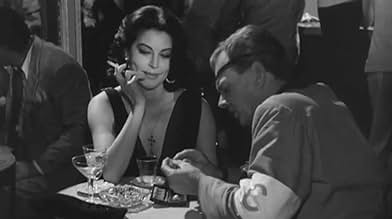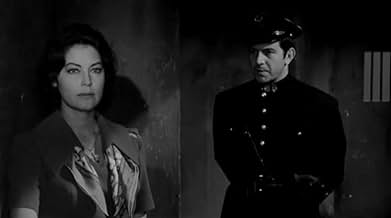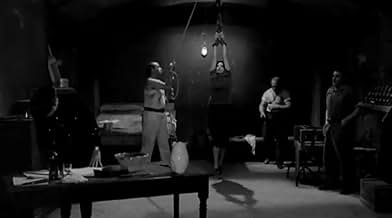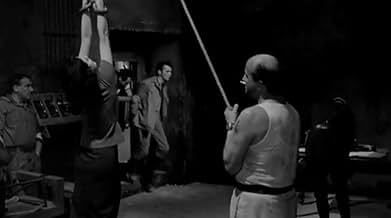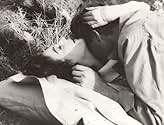Un prêtre et une prostituée se rencontrent pendant la guerre civile espagnole, et leur relation contribue à réveiller les fantômes du passé en chacun d'eux.Un prêtre et une prostituée se rencontrent pendant la guerre civile espagnole, et leur relation contribue à réveiller les fantômes du passé en chacun d'eux.Un prêtre et une prostituée se rencontrent pendant la guerre civile espagnole, et leur relation contribue à réveiller les fantômes du passé en chacun d'eux.
- Réalisation
- Scénario
- Casting principal
Robert Bright
- Father Idelfonso
- (non crédité)
Franco Castellani
- José
- (non crédité)
Nino Castelnuovo
- Capt. Trinidad
- (non crédité)
Robert Cunningham
- Mac
- (non crédité)
Gustavo De Nardo
- Maj. Garcia
- (non crédité)
Franco Fantasia
- Cabaret Customer
- (non crédité)
Armando Fracassi
- Nationalist Prisoner
- (non crédité)
Avis à la une
There's an interesting story here on a number of levels but at roughly 1:40 minutes there's not enough time to tell them all well, which it tries to do. Really didn't understand the point of Joseph Cotten's journalist, even as an expository device. I'll leave criticisms or praise of the treatment of the civil war to others with more than the passing knowledge I have. Someone noted the cramped and dark cinematography, which worked for some scenes but not what might have been some of the more grand-scale scenes, which looked like they were cropped or framed so as not to admit incongruous sites or things into the shots. The lovers are a bit too aware of their fate it seems for them to have a realistic relationship. This one's OK for a watch but for characters bound up in a tragic relationship during revolution and civil war, it is no Dr. Zhivago.
This film has an abiding place in my film canon, for one very good reason.
It isn't a great film, as both the other IMDb reviewers have gone out of their way to stress (although some of their criticisms were a little unfair. I thought, for example, that Joseph Cotten fared better than they say). However, it is virtually the only entertainment vehicle I have ever seen - including film, TV, radio, newspaper, magazine - that dares to show the truth about the left-wing Republicans/anti-Nationalists in the Spanish Civil War.
The Spanish Republicans have been lionised for decades for their allegedly heroic struggle against fascism (although it is actually a moot point to what extent Franco's Nationalists were fascist). However, this film is brave enough to show the truth - that the Spanish Republicans singled out religious targets and many harmless middle class targets and killed or persecuted them. It also dares to show the truth that the Republicans ran the areas they controlled along Stalinist lines. Which is not surprising, given the links with Communists and Stalinist Russia that some of them had.
The file deserves enormous credit for showing this, and it is a shame that no-one has pointed this out on IMDb - until now.
It isn't a great film, as both the other IMDb reviewers have gone out of their way to stress (although some of their criticisms were a little unfair. I thought, for example, that Joseph Cotten fared better than they say). However, it is virtually the only entertainment vehicle I have ever seen - including film, TV, radio, newspaper, magazine - that dares to show the truth about the left-wing Republicans/anti-Nationalists in the Spanish Civil War.
The Spanish Republicans have been lionised for decades for their allegedly heroic struggle against fascism (although it is actually a moot point to what extent Franco's Nationalists were fascist). However, this film is brave enough to show the truth - that the Spanish Republicans singled out religious targets and many harmless middle class targets and killed or persecuted them. It also dares to show the truth that the Republicans ran the areas they controlled along Stalinist lines. Which is not surprising, given the links with Communists and Stalinist Russia that some of them had.
The file deserves enormous credit for showing this, and it is a shame that no-one has pointed this out on IMDb - until now.
Though far from perfect, I could watch this movie again, and perhaps even more than that. It's a fascinating movie, for one thing, pairing two of the most beautiful people who ever lived, in a story with real depth, or at least the promise of real depth, which says a lot in a world where 99 movies out of 100 don't even try. Imagine, complaining that at 37, Ava Gardner was "past her prime." It is wonderful to see Bogarde, whose roles usually had him sneering worldly-wise ironies, showing heartfelt passion for the good and the true. It is equally wonderful to see Gardner in a role far more suited for her than the calculating charmer or the tormented playgirl. She never seemed to be really trying until this one, where perhaps the part touched something deep in her. Their chemistry was superlative, their love scene one of the greats of all time, in my view.
That this portrayal of a love that goes beyond time and place occurs in the context of one of the most astonishingly wicked and absurd wars of all time is another sublimity that seems to have whizzed right by all but one of the previous reviewers. Hemingway showed only that Robert Jordan thought the war was absurd, he didn't show its absurdity, which director Nunnally Johnson managed to do here in both direction and dialog, and against great odds. Like another of my favorites, Viva Zapata, this movie is a flawed masterpiece, better by far than 100 polished banalities. Blame its flaws on the trials of filming in 1960 (still stuck in the 50s), on sloppy editing, on the meaningless title, and the inevitable hurdles that writers and directors have to overcome in the complicated and difficult art of film-making, truly daunting in the case of this film. (Imagine attempting to film a love story between a priest and a prostitute in 50s Sicily?!) Don't blame the the actors, the director, or the beautiful and poignant story.
That this portrayal of a love that goes beyond time and place occurs in the context of one of the most astonishingly wicked and absurd wars of all time is another sublimity that seems to have whizzed right by all but one of the previous reviewers. Hemingway showed only that Robert Jordan thought the war was absurd, he didn't show its absurdity, which director Nunnally Johnson managed to do here in both direction and dialog, and against great odds. Like another of my favorites, Viva Zapata, this movie is a flawed masterpiece, better by far than 100 polished banalities. Blame its flaws on the trials of filming in 1960 (still stuck in the 50s), on sloppy editing, on the meaningless title, and the inevitable hurdles that writers and directors have to overcome in the complicated and difficult art of film-making, truly daunting in the case of this film. (Imagine attempting to film a love story between a priest and a prostitute in 50s Sicily?!) Don't blame the the actors, the director, or the beautiful and poignant story.
A fairly potent script with an interesting plot device at its core (both believers and non-believers alike chase after a sacred religious relic during a bloody civil war), undermined by rather bland, pedestrian film-making. Thus, it's not terribly surprising this was the last film directed by the prolific screenwriter Nunnally Johnson. He shoots just about everything in an overly dark and cramped way making it often impossible to determine where a scene is set, let alone what is going on or even who is in it. This may have been intentional, with the absence of light meant to convey the spiritual darkness in which the country of Spain was submerged at the time, but it comes off as crude and makes for rough viewing. There's something strange about the sound as well; there are few if any sufficiently lit close ups and it seems as if some of the actors' voices have been dubbed. Vittorio DeSica's character, for instance, comes across a bit like Truman Capote playing General Patton. Joseph Cotten pops up every now and again, as a cynical, gravel-voiced newsman, (in fact, he also narrates) but you never ever really see his face and there is something disembodied about his entire presence. It's all a bit unsettling.
Nonetheless, if you can endure its flaws, the movie raises some thought provoking questions on the nature of faith and religion in times of strife, and Dirk Bogarde is quite impassioned as the troubled priest. Ava Gardner, however, is noticeably past her prime as Bogarde's love interest, and her character isn't adequately fleshed out.
Nonetheless, if you can endure its flaws, the movie raises some thought provoking questions on the nature of faith and religion in times of strife, and Dirk Bogarde is quite impassioned as the troubled priest. Ava Gardner, however, is noticeably past her prime as Bogarde's love interest, and her character isn't adequately fleshed out.
10clanciai
This is a fascinating story with many aspects and undertones of fathomless depth and a very different view of the Spanish civil war than what is usually represented. The drama grips you at once, as the young priest leaves the church demonstratively in protest, which immediately throws you into an interesting development of character and events, as the civil war breaks out. Joseph Cotten is an American journalist who gives the drama a form, but Ava Gardner is the central figure, 'the angel in red', a prostitute in a night club which the unfrocked priest finds himself at home in. Another character is Aldo Fabrizi, who here repeats his martyrdom from "Rome, open city" as the carrier of the one holy thing still remaining as a hope for the people, a relic with a drop of a saint's blood with apparently tremendous national meaning to both believers and non-believers. On top of it all there is Vittorio de Sica as the general who better than anyone else sees through the utter absurdity and madness of this civil war.
It is possibly the best film of the Spanish civil war that has been made, in spite of its foibles, as it presents a fairer and broader insight into the war than any other film I have seen on this bloody mess, which almost went on from 1936 until the year of the second world war, as an introduction. The love story is totally convincing and 'organic', as Polanski would have said, but the pathos of the film is tremendous, almost giving a documentary presentation of the war but from below, from the view of common people, a prostitute, a defrocked priest and innocent victims. It's like one of Graham Greene's best novels, but the music adds an extra dimension of beauty and infinite suffering and sorrow as well, like to the shocking war pictures of Goya. It's a great film, it can't be denied, and its lacks and wants are not enough to reduce anything of its deeply human and fascinating greatness.
It is possibly the best film of the Spanish civil war that has been made, in spite of its foibles, as it presents a fairer and broader insight into the war than any other film I have seen on this bloody mess, which almost went on from 1936 until the year of the second world war, as an introduction. The love story is totally convincing and 'organic', as Polanski would have said, but the pathos of the film is tremendous, almost giving a documentary presentation of the war but from below, from the view of common people, a prostitute, a defrocked priest and innocent victims. It's like one of Graham Greene's best novels, but the music adds an extra dimension of beauty and infinite suffering and sorrow as well, like to the shocking war pictures of Goya. It's a great film, it can't be denied, and its lacks and wants are not enough to reduce anything of its deeply human and fascinating greatness.
Le saviez-vous
- AnecdotesThe film was originally planned to be shot on-location in Spain. However, due to the unflattering portrayal of Nationalists in the Spanish Civil War, the Franco regime declined permission.
- GaffesWhen the prisoners are being marched for several days to be presented to the fascists, the group contains a substantial number of women. At least two women are shown confessing to Arturo. But when the fascists capture the group, Arturo tells the commander that the group consists of 200 men who should not be killed, no mention of women. When Arturo enters the church to tell the prisoners they are to be executed, the group is all men. The women have vanished.
- ConnexionsFeatured in Best in Action: 1960 (2018)
Meilleurs choix
Connectez-vous pour évaluer et suivre la liste de favoris afin de recevoir des recommandations personnalisées
- How long is The Angel Wore Red?Alimenté par Alexa
Détails
Box-office
- Budget
- 1 843 000 $US (estimé)
- Durée1 heure 35 minutes
- Couleur
- Rapport de forme
- 1.85 : 1
Contribuer à cette page
Suggérer une modification ou ajouter du contenu manquant

Lacune principale
By what name was L'ange pourpre (1960) officially released in India in English?
Répondre

